 |
|
 |
|
| About Us | Essential Library | Read Past Issues | Resources | Composer Links |
Dennis Russell Davies' Final Bow As Music Director American Composers Orchestra celebrates its 25th anniversary and concludes its season Sunday, April 14 at 3:00 pm at Carnegie Hall. The program pays tribute to ACO’s two principal founders: Dennis Russell Davies, who closes out his 25-year tenure as ACO’s music director and principal conductor; and composer and ACO president Francis Thorne, whose Concerto for Orchestra receives its world premiere. Also on the program is the world premiere of Kevin Puts’ Falling Dream, commissioned by ACO and BMI Foundation's Carlos Surinach Fund, Elliott Carter’s imposing “Variations for Orchestra”, and John Cage’s “Concerto for Prepared Piano and Chamber Orchestra” with soloist Margaret Leng Tan. “For this concert I really wanted a program that summed-up what ACO was all about,” says Music Director Davies. “For 25 years this orchestra has risen to the challenge of what is new, of juxtaposing myriad American styles, of introducing emerging talent, and collaborating with so many American composers to bring their music to life. I wanted to throw the spotlight on the players in this terrific orchestra, many of whom have been with us since our first season. The Carter ‘Variations’ will do that beautifully, and that’s why I asked Franny (Francis Thorne) to write a concerto for them,” Davies adds. Davies and Thorne, along with composer Nicolas Roussakis and conductor Paul Lustig Dunkel, founded American Composers Orchestra in 1977 to address the lack of opportunity for American composers writing orchestra music. In its 25 years, ACO has performed over 500 works by American composers, including more than 100 world premieres and commissions—and ACO remains the only orchestra in the world exclusively devoted to the performance, commissioning and dissemination of music by American composers. Last season, ACO appointed its next generation of artistic leadership, naming the young American conductor Steven Sloane Music Director Designate, and composer Robert Beaser Artistic Director. Though the April 14 concert marks his last as Music Director, Davies is not saying farewell to ACO; he will assume the post of Conductor Laureate next season when Sloane becomes Music Director. “They’ll never get rid of me,” Davies jokes.
|
TOP CLASSICAL: What is Britain's most-loved classical music? Listener's of the UK's Classic FM voted Rachmaninoff's Second Piano Concerto on top. Bruch clocks in at No. 2. New to this year's list is John Williams' score for the Harry Potter movie... The Independent (UK) 04/02/02 WHY IT SOUNDS DIFFERENT: Why is American music different from European music? Perhaps the American variety comes from experimentation with sound, while European music started with an idea. "From such poundings on pianos and yowlings of cats American music began. Specifically, it sprang from a delight in sounds not found in 'correct' European music. Such legends, with their delight in rebelliousness and transgression, are a far cry from the origin story of European music, by which Pythagoras heard four hammers hitting an anvil in the perfect concord C, F, G, C." NewMusicBox 04/02 GOOD BUT POOR: Scottish Opera has been applauded for its recent productions and the company is celebrating its 40th birthday. But the company is struggling financially. This season was scaled back, even after an emergency infusion of public cash. And the Arts Council is dropping large hints that funding for expensive arts like opera are on the decline. The Scotsman 04/03/02 FROM STREET TO STAGE: "Classical music's newest sensation is the OperaBabes, two attractive young female singers whose record label, Sony Music, has earmarked them as one of its top projects of the year. Yet less than a year ago, Karen England and Rebecca Knight were busking outside the Royal Opera House at Covent Garden in London.The novelty of their approach is to give personal adaptations of classic arias and great classical orchestral works. They will, for example, almost heretically add their own lyrics to Dvorak's New World Symphony." The Independent (UK) 04/01/02 POPULAR LURE: Crossovers between pop music and classical work so rarely, why does anyone bother? "Good pop expresses the inexpressible; it speaks where thought collapses. It is still an unknown language. It is a little like a beaten virus. Once it's inside you, a part of it stays, perpetually infecting and protecting at once. With power like this at his fingertips, is it strange that a pop composer will occasionally take a liberty with an opera star? And with that kind of effectiveness and reach, is it strange that orchestral stars should long, by association with pop, to achieve the same infinite engagement with every individual audience member?" The Observer (UK) 03/31/02 BUY AMERICAN: One reason why so many American singers, male and female, are in constant demand is that they are almost always thoroughly trained, in addition to a basic knowledge of how to use their voices, in stagecraft and in the ability to read and quickly memorise a score. Some of them are stars, others are capable youngsters on the way up. The youngsters rehearse the history of many of the stars in being ready, at the shortest possible notice, to master a difficult piece of music in order to replace an absent or indisposed singer and in having the all-round competence to find their way round an unfamiliar stage with only a resident director or two to prompt their next move from the wings. This helps to explain why some operatic occasions at - to pick one outstanding example - the Salzburg Festival seem like a club of expatriate American singers." Sydney Morning Herald 04/05/02 ONLY FOR A LIMITED TIME: The New Jersey Symphony has received a mind-blowing offer from a long-time subscriber. Collector Herbert Axelrod wants to outfit the orchestra's first violins with Strads and Guarneris, and also supply a particularly beautiful Strad for the principal cellist. The instruments being offered are valued at $50 million, but Axelrod is offering them to the NJSO for half price, an unprecedented discount. The catch? The orchestra must come up with the money by June 30. Boston Globe (AP) 04/04/02 WHAT
KILLED BEETHOVEN? A popular book has claimed that the German master
was doomed to deafness and eventual death by lead poisoning, based on DNA
analysis of a lock of his hair. But not everyone is convinced, and experts
have been raising questions about the reliability of hair analysis, and
pointing out that the lead poisoning theory is inconsistent with Beethoven's
late-life musical output. Pittsburgh Post-Gazette 04/04/02
|
Electronic Dialogue/14 An Interview with Gloria Coates
In 1986, Coates was one of the 10 finalists for the International Koussevitsky (KIRA) Award which honors a living composer for an important work for her composition "Music on Open Strings." She has been the recipient of numerous awards, commissions and distinctions. Coates' music has been performed by leading soloists, ensembles and orchestras such as the Bavarian Radio Symphony Orchestra, Brooklyn Philharmonic, Stuttgart Philharmonic, Milwaukee Symphony, Saint Paul Chamber Orchestra, the London Sinfonia, Polish Chamber Orchestra, various international chamber ensembles including Das Neue Werk Hamburg, the Dresden Ensemble for New Music and the Kronos Quartet. Her work Music on Open Strings, written in1973 for orchestra, was premiered at the Warsaw Autumn of 1978 and proved to be the most widely discussed work on the Festival. In 1979 she was commissioned to write a work for the East Berlin Festival, the first non-socialist composer ever to be performed on it. Some other Festivals include the Dresden Festival, New Music America - New York 1989, Musica Viva Munich, The New York Microtonal Festival, Henze's Festival Montepulciano, Passau International Festival, and the Dartington Festival in England. From 1969 to 1989, Coates lived in Europe where hers was a powerful voice on behalf of American music. She has lectured, written musicological articles, produced and broadcast radio programs, and organized a concert series of German-American music in Munich from 1975 - 1984. Since 1989 Gloria Coates has divided her time between the United States and Europe. In addition to her composition, she is a trained painter and the CD covers featured in this article are photos of her work. Coates'
canon of work includes compositions for orchestra (13 symphonies), chamber
(7 string quartets) and solo music, vocal (a song cycle on poems by Emily
Dickinson), choral music, live electronic and music for the theater. Her
string quartets 1, 5 and 6 have just been released on Naxos CD.
S21: You are best-known for your symphonies. How do you decide what constitutes a symphony? What elements must a work contain to be a symphony rather than, say, an Essay as Barber sometimes called his pieces)? Does your definition somehow relate to Mahler's idea that a symphony is a work that contains everything it takes to make a "world?" GC: It was never an intention of mine to write a symphony, although since 1973 I had written quite a number of orchestral works with three or four movements, always changing the titles and never being satisfied. Sometimes they would be related to the structures such as "Music on Open Strings" and sometimes to the emotional content such as "Illumination in Tenebris." Finally in 1990, all titles seemed totally unfitting to a new orchestral work which lasted a half hour and had 52 instruments playing simultaneously. This was a very serious work and had used various structures that I had developed over many years in a new way, and it seemed heavier in comparison to my other compositions.
Classical Grammy Winners |
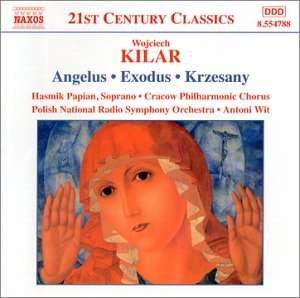
Angelus; Exodus; Krzesany Composer: Wojciech Kilar Conductor: Antoni Wit Performer: Hasmik Papian Naxos - #8554788 Not as well-known as his fellow Poles, Kilar is, nonetheless, extremely well-known in the world of film where he has written music for more than 100 movies. His music is strong, theatrical and filled with adenture. Nothing here is less than dramatic and much is downright unforgettable. |
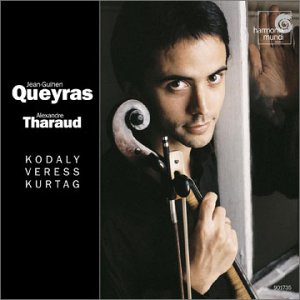
Cello Works Composer: Kodaly, Veress, Kurtag Performer(s): Jean-Guihen Queyras, Tharaud Harmonia Mundi Franc - #901735 Marvelous playing from young Queyras whose technique is so formidable that he makes Kodaly's torturous and melancholy Sonata for Solo Cello, Op.8 sound like fun, which may be the wrong idea, but is no less awesome for the performance. Highly recommended. |

Chanson D'Amour Composer: Amy Beach Performer: Emma Kirkby Ensemble: The Romantic Chamber Group of London Bis - #1245 Amy Beach's setting of Victor Hugo's L'aube naît, et ta porte est close! may have come after settings by Donizetti, Gounod, Lalo and Widor but hers is better than any of the boys.' |
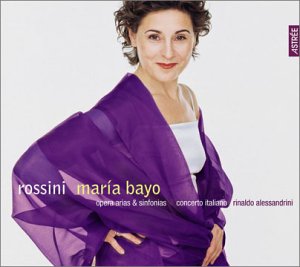
Opera Arias and Overture Composer: Gioachino Rossini Conductor: Rinaldo Alessandrini Performer: Maria Bayo Ensemble: Concerto Italiano Astree - #8853 |

Thomas and Beulah Composer: Rita Dove and Amnon Wolman Performer(s): Ursula Oppens & Cynthia Haymon Innova Records - #559 A theatrical song-cycle based on the Pulitzer Prize-winning collection of poems by Rita Dove, Thomas and Beulah, traces the lives of her grandparents. In live performance hanging scrims and theatrical lighting were used to separate and illuminate each audience section, providing a physical parallel to the music¹s changing points of view. This dramatic setting is recaptured on the multi-media portion of the disc. Wolman's perfectly-integrated music incorporates computer-generated sounds, often combined with acoustic instruments. |

Why is this night different?, Tuireadh, Visions of a November Spring Composer: James MacMillan Performer: Robert Plane Ensemble: Emperor String Quartet Bis - #1269 MacMillan's writing seems to inhabit two worlds: modern choral works that are often dissonant and suggest elements of Messiaen; yet they also reflect harmonies and plainsong-influenced melodic lines that are as old as the ages. You don't need to be a believer to appreciate the sounds of the spirits he brings to life.
|
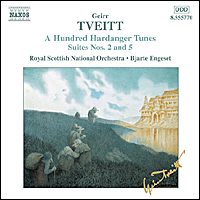
Hardanger Suites Nos.2 & 5 Composer: Geirr Tveitt Peformer: Royal Scottish National Orchestra Bjarte Engeset, conductor The latest offering from Naxos from the greatly underrated Norwegian genius Geirr Tveitt. Tveitt studied in Leipzig, Vienna and Paris with teachers including Honegger, Villa-Lobos and Wellesz, but his cosmopolitan style stemmed mainly from deep roots in his family’s native Hardanger region, whose folk tradition Tveitt made his own in these richly imaginative orchestral suites. "If a leaf grows on a birch tree," he said, "It has to be a birch leaf." |
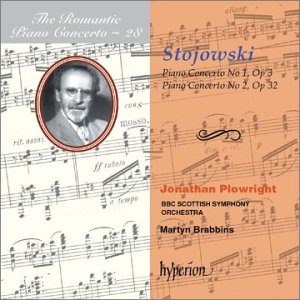
Piano Concertos 1 and 2 Composer: Stojowski BBC Scottish Sym OrchGeorge Hyperion - #67314 Yet another in Hyperion's endless series of romantic piano concertoes, these two glorious, high-spirited works are the product of the imagination of a Polish composer named Sigismond Stojowski who is today a completely forgotten name to all but the most dedicated piano aficionados. Like so many "discoveries" in this invaluable series, one wishes the programmers would give the Grieg and the Schuman a rest and play some of these gems for a change. |
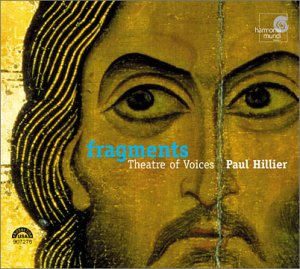
Fragments Performer(s): Theatre of Voices, Hillier Harmonia Mundi Franc - #907276 Not contemporary, of course, but strangely "modern" and invaluable for those who aren't quite sure where Arvo Part, John Tavener or James MacMillan are coming from. |
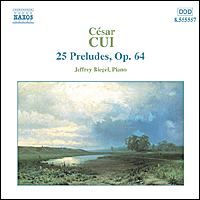
25 Preludes, Op. 64 Composer: César CUI Performer: Jeffrey Biegel Naxos - #8555557 |

Piano Sonatas Nos. 6 & 8 Composer: Sergei Prokofiev Performer: Francois-Frederic Guy Naive - #4898- François-Frédéric Guy sounds amazingly like a young Sviatoslav Richter as he powers his way through the climaxes of Prokofiev's demanding scores. Yet, he can also play quietly (as in the Sixth Sonata's Allegretto). One suspects we'll be hearing more about young Mr. Guy. |
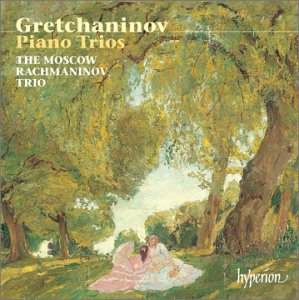
Piano Trios / Cello Sonata Composer: Leo Brouwer Performer: Elena Papandreou Naxos - Fans of late romantic chamber music will find much to enjoy here. Gretchaninov left Russia after the Revolution, settled in Paris, and eventually moved to New York, where he died in 1956 at the age of 91. His works are Russian, yet also reflect his French and American influences. The performances are excellent. |
|
One-Minute Web Guide The essential guide to intelligent life on the internet |
Publisher: Duane Harper Grant (212) 582-4153 Editor: Jerry Bowles (212) 582-3791 Contributing Editors: Armando Bayolo, Sam Bergman, Joshua Cohen, Karina Cristina Demitrio, Deborah Kravetz (C) Sequenza/21 LLC 2000 |